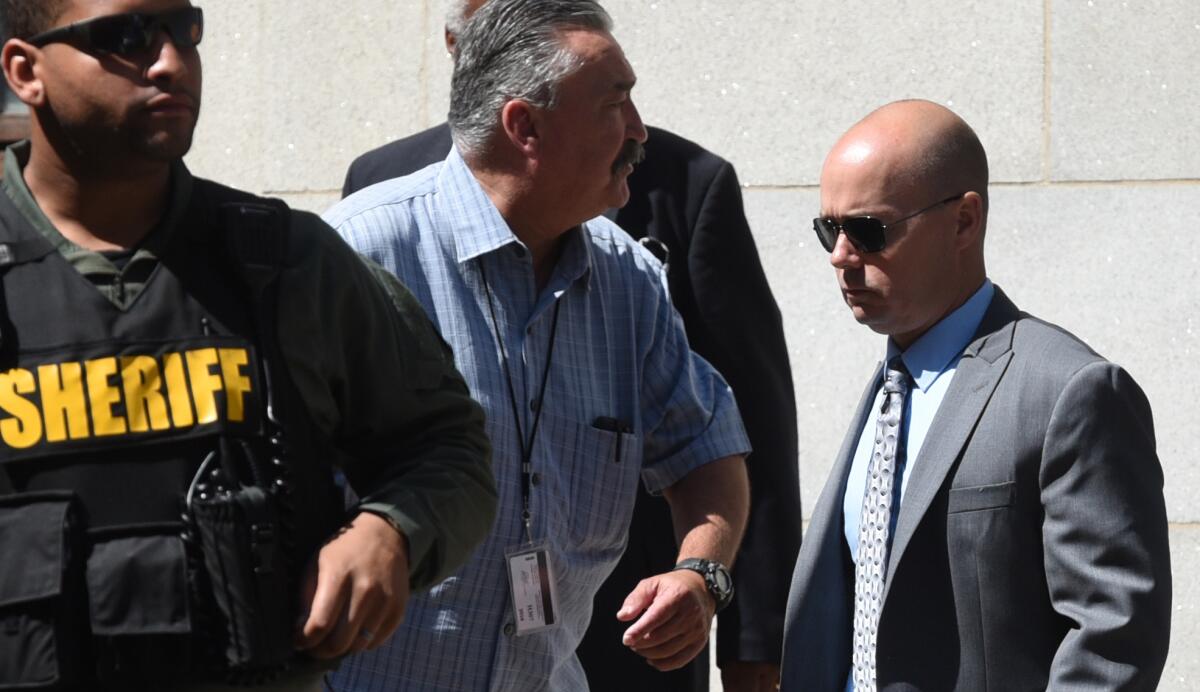Freddie Gray case: After three acquittals, prosecutors face tough challenges in remaining trials, experts say

- Share via
Reporting from Baltimore — With three acquittals and a hung jury in the trials of Baltimore police officers charged in the arrest and death of Freddie Gray, prosecutors face steep hurdles to winning convictions in the three remaining cases, legal experts said.
Circuit Judge Barry G. Williams, who cleared Lt. Brian Rice of all charges Monday, sent a strong message that the state’s attorney’s office lacks the evidence to prove the officers’ conduct was criminal, observers said.
“The state is not simply 0-for-4,” said defense attorney Warren Brown, who is not involved in the cases but has observed the proceedings. “They’re 0-for-24 when you add up all the charges that the judge or jury considered through the course of four trials.”
Rice was the fourth of six officers charged in the case to go to trial, and the third to be acquitted by Williams. Another officer’s trial ended with a hung jury and mistrial.
Prosecutors alleged that Rice, the highest ranking officer of the six charged, had caused Gray’s death by failing to secure him with a seat belt in the back of the police van where Gray suffered severe spinal cord injuries last year. Gray, 25, died a week after his arrest. His death sparked widespread protests against police brutality.
Rice, 42, was found not guilty of involuntary manslaughter, misconduct in office and reckless endangerment.
“The judge has said over and over and over again [that the evidence] falls short of convincing him beyond a reasonable doubt” that the officers are criminally culpable, Brown said.
That doesn’t necessarily mean prosecutors should drop the remaining cases, one expert said.
University of Maryland law professor Douglas Colbert said the trials are sending a message to police. Prosecutors should adapt their strategy based on Williams’ latest ruling and keep going, he said.
Prosecutors and defense attorneys are barred from speaking publicly about the cases because of a gag order imposed by Williams.
Officer Garrett Miller is the next officer scheduled to be tried. Miller’s case is fraught with new challenges for prosecutors: Because Miller was compelled to testify under immunity at the trial of Officer Edward Nero, a new team of prosecutors was appointed to handle his case.
An elected official cannot fall to the public pressure being placed by the police union and others.
— Douglas Colbert, University of Maryland law professor
“It would be irresponsible not to continue prosecution as long as our elected official believes that there’s evidence to satisfy the burden of proof beyond a reasonable doubt,” Colbert said, referring to Baltimore State’s Atty. Marilyn J. Mosby. “An elected official cannot fall to the public pressure being placed by the police union and others.”
Before his trial, the court will hold a hearing at which prosecutors will have to prove that they were not exposed to any of Miller’s testimony in the Rice case. During the process in which prosecutors lobbied to compel Miller to testify, Williams, the Maryland attorney general’s office and the Court of Appeals all said prosecutors face a high bar at such a hearing.
Officer William Porter also was compelled to testify, and his retrial also will require such a hearing, known as a Kastigar hearing. The third officer who still has pending charges is Sgt. Alicia White.
Miller’s case focuses on Gray’s initial detention and arrest. Nero was already acquitted for his role in arresting Gray, and prosecutors dropped a charge against Rice related to that aspect of the case.
See the most-read stories this hour »
Williams left some room for prosecutors in Miller’s trial, finding that Nero did not participate directly in the arrest without rejecting prosecutors’ argument that the detention was illegal. Still, he skeptically questioned prosecutors during closing arguments of Nero’s trial.
David Jaros, a University of Baltimore law professor who has been observing the trials, said prosecutors’ best hope might be if Miller made an incriminating comment in his statement to investigators.
“This is a hard case,” Jaros said. “There are reasons to have doubts about what happened.”
But Jaros said people watching the cases shouldn’t interpret Williams’ verdicts as absolving the officers of wrongdoing.
“The judge made it clear that just because you made a mistake — someone may have done something that was very wrong, that was very inappropriate — but that doesn’t necessarily make it a crime,” Jaros said.
“If you do something that is grossly unreasonable, but you’re not aware of the risk you’re taking, you’re not being grossly criminally negligent, even though you’re being negligent,” he said.
Williams repeatedly emphasized Monday that there was a difference between civil negligence — finding that the officers’ conduct caused Gray’s death — and criminal liability — determining that their conduct had been so reckless, with results that could have been anticipated, that they should be convicted of a crime.
David Harris, a University of Pittsburgh law professor who studies racial profiling and police misconduct, said that while he is “strongly sympathetic that police ought to be held accountable for wrongdoing,” prosecutors have proceeded with a legally dicey case.
“The American legal system is very reluctant to hold anybody, not just these police officers but anybody, criminally responsible for not doing something,” Harris said. “Criminal law is not always the best tool available. Many times it feels like it should be, when there has been a parade of injustices over so many years. But any given case depends on its facts and evidence.”
Fenton writes for the Baltimore Sun.
ALSO
Baton Rouge had escaped New Orleans’ racial tensions. Then came Alton Sterling.
When are police justified in using deadly force?
From Ferguson to Baton Rouge: Deaths of black men and women at the hands of police
More to Read
Sign up for Essential California
The most important California stories and recommendations in your inbox every morning.
You may occasionally receive promotional content from the Los Angeles Times.













